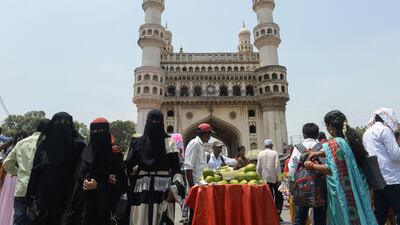India's Prime Minister Narendra Modi has created a stir by referring to the southern city of Hyderabad as Bhagyanagar, the name his party has long sought to give the medieval city.
“Hyderabad is Bhagyanagar,” Mr Modi said at a meeting of the Bharatiya Janata Party's national executive in Hyderabad — known for its pearls and heritage of erstwhile Muslim rulers called nizams — that is now capital of Telengana state.
His remarks come as the BJP is trying to gain a foothold in the state ruled by a regional party, the Telangana Rashtra Samithi.

Hyderabad or Bhagyanagar?
The origins of Hyderabad as the name of the city, founded in 1591 by Mohammad Quli Qutub Shah, are unclear.
Many say the name Hyderabad has its origins in the last Muslim Caliph Ali Ibn Abi Talib, who was also known as Hyder, meaning lion, for his valour.
Hyderabad, an Arabic-Persian name, translates as “Lion’s city”.
However, many Hindus claim the city’s was initially named Bhagnagar, meaning “city of flowers”, after a Hindu dancing girl named Bhagmati who married the Muslim founder before converting to Islam and taking the name Hyder Mahal.
But another section of Hindus say the city was named after the Bhagyalakshmi temple, a modest structure made of bamboo and tarpaulin adjoining the 16th-century Charminar monument in the Old City.
The Archaeological Survey of India, which oversees historical sites, has said the temple is an unauthorised construction that it did not exist before 1960. It has sent several notices to the city administration for its removal.
Home Minister Amit Shah had paid homage at the temple in 2020 before campaigning for the BJP in municipal elections.
Significance of Hyderabad
After the Mughals briefly ruled Hyderabad, a former Mughal governor Mir Qamar-ud-din Khan conquered the city in 1724 and established the Asaf Jahi dynasty of nizams that ruled the region until 1948.
After the nizams signed a treaty with British colonisers, their territory came to be known as Hyderabad State — the largest princely state in British India with the city of Hyderabad as its capital.
A year after India attained independence in 1947, New Delhi invaded and annexed Hyderabad State after the refusal of the last nizam, Mir Osman Ali Khan, to join the Indian dominion. He was considered to be one of the richest people in the world at the time.
The territory, which included parts of present-day Andhra Pradesh, Telangana, Karnataka and Maharashtra states, was divided on linguistic lines in the 1950s.
Hyderabad city became the capital of the new state of Telangana that was carved out of Andhra Pradesh in 2014 after separatist movement lasting five decades.
Hindu votes
While the renaming of cities is not new in India, the BJP has been particularly active in this regard, changing names of more than a dozen cities since coming to power in 2014.
Several changes in recent decades sought to restore the original names of cities from their anglicised versions, such as changing Bombay to Mumbai and Calcutta to Kolkata.
But more recent changes have largely been in states ruled by the BJP and applied to cities named after historical Muslim rulers or names with Muslim associations.
In Uttar Pradesh, the city of Allahabad was renamed Prayagraj in 2018.
This year, Madhya Pradesh state, also ruled by the BJP, changed the names of three cities, including of Hoshangabad, founded by Hoshang Shah in the 15th century, to Narmadapuram.
Last week, the state government in Maharashtra led by the Shiv Sena, a right-wing Hindu party, changed the names of Aurangabad and Osmanabad cities to Sambhajinagar and Dharashiv, respectively, in its final act before being toppled by a party rebellion.
The push to rename to Hyderabad is regarded as a bid by the BJP to win over the majority Hindu voters in Telengana for region elections due to be held early next year.
The incumbent chief minister, K Chandrasekhara Rao, and his secular party were instrumental in the creation of the state and have been in power since 2014.


